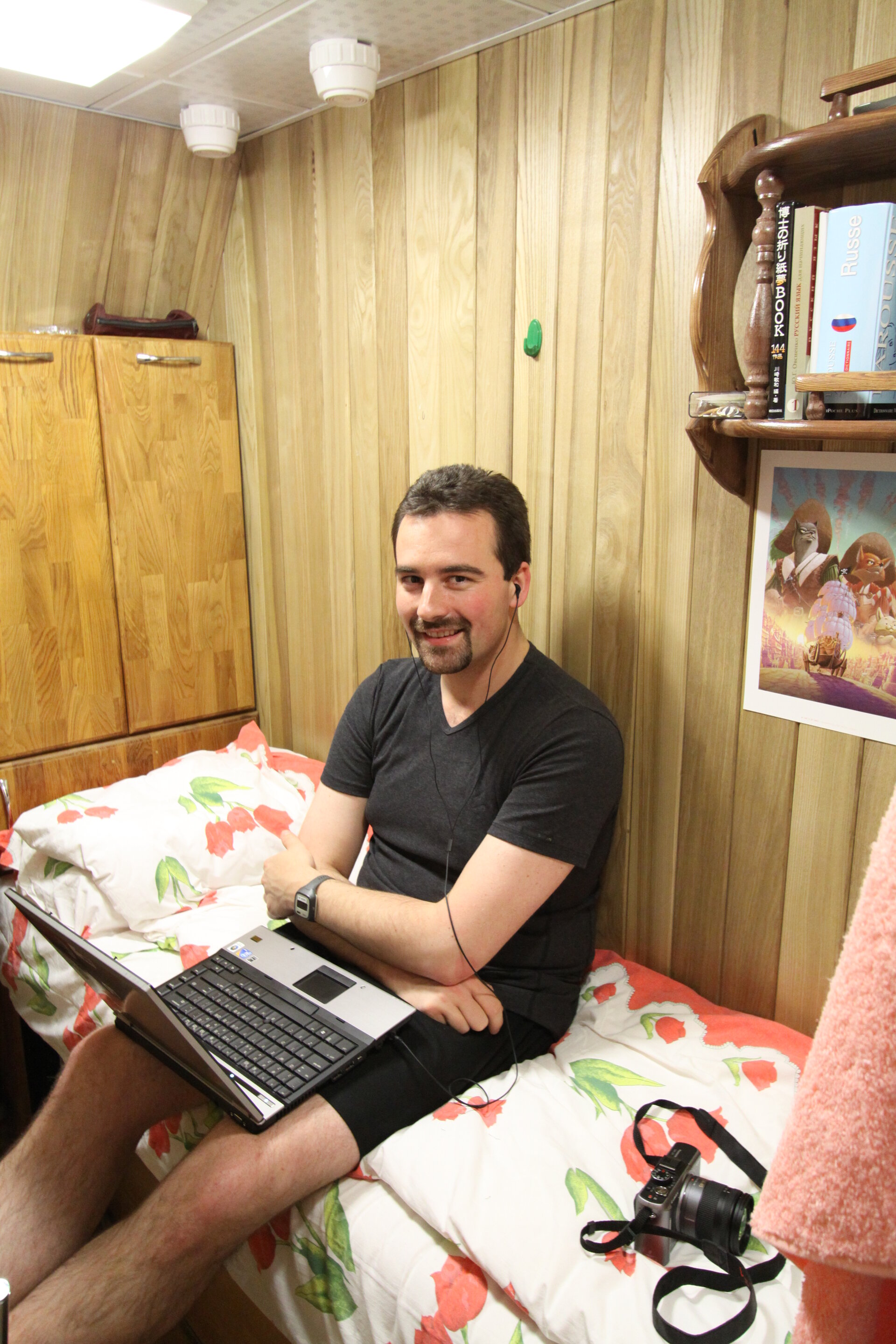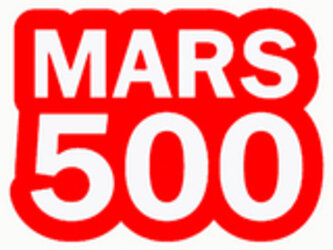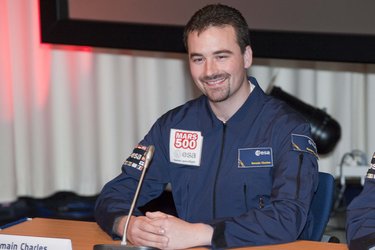Diego and Romain answer your questions 2
The Mars500 crew is answering your questions by email and the second batch of the answers is here.
Questions are welcome from the members of the media and also from anyone else who his interested. As on a real trip to Mars this is not in real-time, questions will be relayed to them through 'mission control'.
Please think carefully about your question and keep it short - the best questions will be selected and sent to the crew to answer! They will answer as many as they can but also have a busy work schedule.
The address is: mars500crew@esa.int.
![]()
Do you think that having a pet (e.i : fish, ants, lizard, etc...) would be beneficial to you on your trip ? If so, how do you think this could be a benefit psychologically and physiologically?
![]()
I think your idea is great, and it would indeed be quite beneficial. In a situation of isolation it is usual to appreciate very much anything that is alive (in our experience the plants for example) let alone something that is alive and could even move! We haven't seen common animals like a fly or a spider in months! I am not fully aware of the physiological consequences of having animals in here (probably not extremely healthy in some cases), but my guess is that small animals like fish or ants would at least not have too many drawbacks if properly contained.
Diego
![]()
Bonjour,
Je m'appelle Benjamin j'ai 9 ans, avec ma maman et mes frères et soeurs on suit votre voyage sur le site !
Nous habitons à Pont du Château en Auvergne et on a vu que vous avez fait vos études à Clermont Ferrand alors ma question est :
Est-ce que vous avez pris du Saint Nectaire pour tenir pendant ce long voyage ?
Mon petit frère de 3 ans et demi passe le bonjour à Buzz l'éclair si vous le voyez là haut !
On pense à vous, bonne chance.
Benjamin Bourdeaud
![]()
Bonjour Benjamin,
J’aurai adoré emporter du Saint Nectaire dans mon vaisseau spatial. Hélas, nous avons un menu très strict à respecter chaque jour puisque nos repas sont une expérience. Le seul fromage que nous ayons ressemble à de la « vache qui rit ».
Rien que de penser au bon St Nectaire que je pourrai déguster dans un an, j’en salive déjà !
Si je croise Buzz alors qu’il va combattre l’empereur Zurg, je ne manquerai pas de lui dire bonjour de la part de ton petit frère.
Romain
![]()
Diego Urbina you have been tweeting and compiling the video messages on you tube has that taken your mind off of the task at hand?
![]()
Thanks for your questions, Lisa. One good thing about Twitter and YouTube is that they don't require much time, as one tweet takes an average of 8.3 seconds to write, and we record videos at the same time we do our daily tasks (then the good folks at ESA Communications take care of the lengthy work of selecting the videos and doing the editing). Getting the feedback from these posts, on the other hand, somehow does help in relieving the sense of loneliness that one can experience here. The use of social networks in long duration space missions is something I am becoming more and more interested in from a scientific point of view. It will be interesting for me to compare the records I keep about these activities and the general psychological data that we frequently gather.
Diego
![]()
Bonjour Romain,
Les sollicitations par mail dont vous faites l'objet (malgré des filtres que j'imagine aussi sévères que nécessaires) doivent être nombreuses. Cette évidence cependant n'a pas eu raison de ma curiosité, que j'ose vous livrer enfin. Je m'interroge sur votre rapport à la lecture. Mais davantage que les livres eux-mêmes que vous avez jugé utile (nécessaire ?) d'embarquer, ce sont les raisons de vos choix qui m'intéressent. Des textes familiers ? De nouveaux auteurs à découvrir ? Des romans pour s'évader ?
Du théâtre pour la vie ? De la poésie pour déclamer ? Des revues techniques pour apprendre ?...etc...
Et si j'osais, la littérature prend-elle une saveur particulière en période de confinement prolongé ? Que vous apporte-t-elle ? Contribue-t-elle davantage encore à stimuler l'imaginaire ? A susciter l'écriture peut-être ? Je n'ignore pas que l'expérience Mars 500 englobe de très nombreux champs d'investigations mais n'ayant lu nulle part un article concernant l'éventuel apport de la lecture pour l'Homme...
Le plaisir que j'ai eu à vous écrire ne s'effacera qu'avec celui de vous lire peut-être. Je vous adresse donc, quoiqu'il en soit, tous mes remerciements et vous souhaite le plus beau des voyages intérieurs !
Cordialement,
Didier Vergez
didier.vergez@gmail.com
![]()
Bonjour Didier,
La lecture a un rôle très important pour cette mission Mars 500. Les responsables de l’expérience le savaient bien et nous ont fait une surprise lors de notre entrée dans les modules le 3 juin dernier. Chacun d’entre nous a reçu un lecteur de livres électroniques. En outre, ils ont mis sur le réseau du vaisseau une bibliothèque électronique comportant des milliers de titres. Après quelques recherches infructueuses (il me fallait traduire le nom des auteurs en cyrillique pour faire une recherche pertinente), j’ai relu avec un plaisir non feint plusieurs titres qui m’avaient marqués lors de ma jeunesse : le cycle de Fondation d’Isaac Asimov.
Toutefois j’avais quand même empaqueté quelques « vrais » livres dans ma valise. Pour rester sur le thème des lectures pour le plaisir, j’ai deux romans de Dan Simmons et un d’Alain Damasio ainsi qu’une BD de Boulet. Tous mes autres livres sont liés à l’apprentissage. J’ai emmené mes anciens cours de mathématique et de physique, des livres sur l’astronomie et, dans un autre registre, l’histoire de l’art de E.Gombrich. Je vais essayer de mettre à profit ces 520 jours pour apprendre de nouvelles choses.
Nos lectures sont souvent la base de nos discussions lors des repas. Par exemple, Wang Yue qui est notre plus gros lecteur dévore des dizaines de livres sur l’histoire de la Chine. Nous avons donc eu de nombreux repas animés où il nous raconte l’histoire d’anciens empereurs chinois qui nous sont totalement inconnus.
Je ne pense pas que l’imaginaire soit d’avantage stimulé en isolation qu’à l’extérieur. En tout cas je n’ai pas ressenti de changement de ce côté-là. Cependant, nous sommes au moins 3 à mettre par écrit nos impressions, notre compréhension de ce voyage vers Mars. Les jours passent finalement très vite (déjà 144 !) et nous ressentons le besoin d’écrire pour ne pas oublier tous les moments importants de cette expérience.
Romain
![]()
What real world skills have you been able to apply to your work inside the mars500 project?
![]()
We have a myriad of electronic devices in here. It is not uncommon that these items get damaged or need some troubleshooting, so it is very good to have knowledge in electronics and Information Technology. I have also found my programming skills useful in order to create extra tools that allow to have a friendlier experience with the communications system in place. It has been nice, as well, to be moderately good at graphic design so I can decorate the place or make something nice for the others every once in a while.
Diego
![]()
Hello, I am a french military dentist. I am particularly interested in your experience of a 520-day isolation because I work on aerospace dentistry. I would like to know how the crew is prepared to the unexpected appearance of dental problems during the mission. Dental emergencies are possible even if you undergo a perfect dental examination before the mission. And even these emergencies are not life-threatening, the impact on the mission and the crew can be very important with intense pain, so:
- is there a dental equipment in the medical module?
- are some of the crew members trained for realizing simple dental treatments during the mission?
Doctor GUNEPIN
French military schools of Draguignan
France
![]()
Dear Dr Gunepin,
I needed the help of our crew doctor to answer all your questions.
He explained me that both him, Sukhrob Kamolov, and Alexandr Smoleevskiy graduated from a military medicine academy. They were trained as military general doctors and so they can cope with a lot of emergencies in a field hospital. They are able to extract teeth, clean a tooth, put dental amalgam and use common drugs for the oral cavity.
We have on board of our “spaceship” a small dentist device (to make holes in the teeth), a temporary dental amalgam (should be changed every 6 months) and several drugs and medicines.
We all went through several complete dental examinations before the mission and we have a follow-up examination every month (examination from our crew doctor and pictures sent to our dentist outside). I hope that this will prevent us from any uncomfortable surprise.
Romain
![]()
How are the various nationalities coming together?
Best Wishes
Lisa Higgins BA
United Kingdom
![]()
The differences of culture and experience provides, for example, quite a good topic of conversation, or a wider array of approaches to one single problem. We often learn new things that we didn't expect. I think variety is a positive factor psychologically. As a drawback, it sometimes can impair fluent communication, but this is something you have to work out on a daily basis.
Diego
![]()
Dear guys, I follow you from Italy.
The video diary is very interesting and I hope it will send many others. I have a question that may seem irrelevant, but I think in many have my curiosity. 17 months of travel are of course many and it takes nerves of great firmness and self control, but some aspects of human personality are still unknown.
I ask you how have you prepared the abstinence of sex?
Abstinence in humans can cause nervousness that might affect life on board. Thanks for the response and strength are with you!
Luigi Pizzimenti
![]()
(EN) Ciao Luigi! Great endeavors demand sacrifices. Then, it is not unheard of explorers having to abstain for years, and even more common are religious individuals who do it for all their lives. Knowing that it will not last forever helps, and astronauts that will be chosen for long trips will surely need to be selected taking into account their mind strength in order to deal with this.
(IT) Ciao Luigi! Le grandi imprese richiedono dei sacrifici. Poi, non è strano sentire storie di esploratori che hanno dovuto supportare l'astinenza per anni, e infatti ci sono alcune persone che per cause di natura religiosa lo fanno tutta la vita. Il sapere che non durerà per sempre aiuta, e gli astronauti che saranno selezionati per viaggi così lunghi dovranno essere scelti anche in base alla loro capacità di affrontare questo fatto.
Diego
![]()
Do you think there is future for traditional food of different countries in manned spaceflights/occupied space stations?
![]()
We will have as a matter of fact, some traditional food of different countries during the second half of the mission. It includes Korean, Chinese and Italian food among others. Some restrictions apply, as it has to be food that can be preserved for a long time.
Diego
![]()
Dear Mars 500 Crew
I am very interested in the project and especially how you are doing in isolation. I am actually doing an exhibition display of Mars 500. I would really like to know if you brought pesonal items with you, and what they are. I mean objects or items that remind you of earth. This goes to describing the psychological stress of your test.
Yours sincerely Anne-Mette Arendt, Denmark
![]()
Thank you Anne-Mette. We have various personal items such as letters, drawings some books, little items that remind us of specific places and people. Personally my most valued souvenir from Earth are the pictures and videos that I have in my hard drive. It is so good to be able to hold so much stuff in one little thing!
Diego






